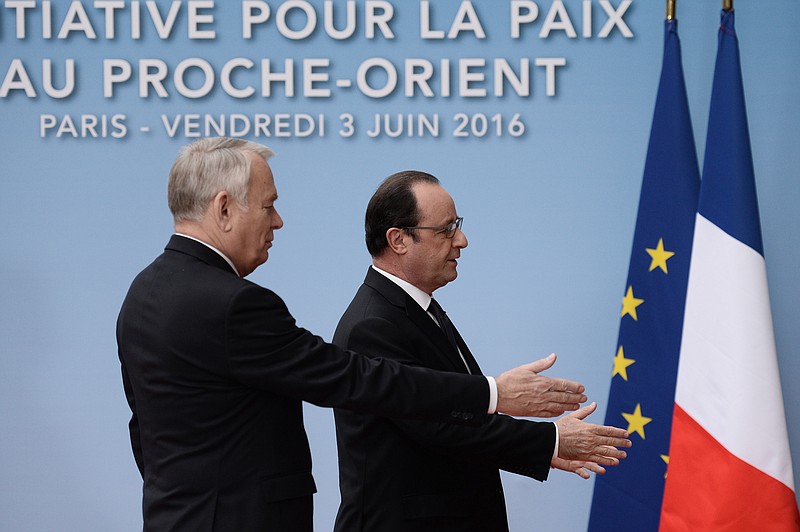PARIS (AP) - Top diplomats from around the world on Friday endorsed France's efforts to revive long-dormant Mideast peace talks aimed at "fully ending" Israel's half-century-old occupation of lands the Palestinians seek for their state.
France wants to set up an international conference by the end of the year that would restart negotiations - despite slim chances of bridging wide gaps between Israelis and Palestinians.
France has said it felt compelled to act because the opportunities for setting up a Palestinian state alongside Israel are slipping away, while the situation in the region is deteriorating.
Israel has rebuffed the French plan, saying only direct negotiations could work. Palestinian officials said Friday the French efforts were too vague.
Neither side was represented at the Paris gathering.
The meeting was attended by U.S. Secretary of State John Kerry, U.N. Secretary-General Ban Ki-moon as well as representatives from the Arab League, the European Union and key Arab states.
A joint statement called on the two sides to genuinely commit to the two-state solution and create conditions for "fully ending the Israeli occupation that began in 1967."
It said participants were "alarmed that actions on the ground, in particular continued acts of violence and ongoing settlement activity are dangerously imperiling the prospects for a two-state solution."
The gathering agreed to set up teams by the end of the month to work on economic and security incentives for the Israelis and Palestinians for reaching a deal, said French Foreign Minister Jean-Marc Ayrault.
In his opening speech, French President Francois Hollande said that "our initiative aims at giving them guarantees that the peace will be solid, sustainable and under international supervision."
Kerry was non-committal when asked if he would support an international conference later this year, with Israelis and Palestinians attending.
"We're just starting, let's get into the conversations," he said.
Israeli Prime Minister Benjamin Netanyahu has rebuffed the French initiative. Netanyahu spokesman David Keyes said Friday that "peace is not going to come through imposition."
Israel has indicated an openness recently to some elements of an Arab peace proposal from 2002, which promised peace and recognition of Israel by the Arab and Muslim world in exchange for the creation of a Palestinian state.
Israeli officials have given no indication of any recent movement on the proposal.
Palestinian President Mahmoud Abbas has welcomed France's efforts, in part because it could potentially end a two-decade-old U.S. monopoly on mediation. Palestinians have long complained that the U.S. heavily favors Israel and cannot serve as an honest broker.
The Palestinians seek to establish a state in the West Bank, Gaza Strip and east Jerusalem, lands Israel captured in 1967. In 2012, the U.N. General Assembly overwhelmingly recognized a state of Palestine in these boundaries, though setting up an actual state would require a deal with Israel.
Palestinian officials said Friday's statement was too vague and said they hoped it would be followed by specifics, including a framework for talks.
"We should not raise expectations now," said Saeb Erekat, an aide to Abbas. "I hope we will see the terms of reference specified for all core issues being taken into account."
For now, chances of reviving negotiations appear remote because of a lack of common ground.
Unlike his predecessors, Netanyahu refuses to recognize the pre-1967 lines as a starting point for border talks, with agreed upon land swaps - the internationally backed formula for a peace deal.
Abbas says there's no point going back to talks without ground rules and a timeline for a deal.
Continued Israeli settlement expansion on occupied lands and several months of renewed Israeli-Palestinian violence have also undermined trust.
It's not clear how the French efforts would bridge those gaps.
The last high-level Israeli-Palestinian negotiations were held in 2008 between Abbas and then-Prime Minister Ehud Olmert. Subsequent efforts to restart meaningful talks have failed, most recently in 2014 when Kerry aborted a mediation mission following a year of low-level Israeli-Palestinian meetings.
Abbas aides have said they want other world powers to get involved, like in last year's deal on Iran's nuclear program. The existing model of Israeli-Palestinian talks brokered by the U.S. has failed because of the power gap between an occupying power and those it occupies, they have said.
___
Associated Press writer Karin Laub in Amman, Jordan, Bradley Klapper in Paris and Ian Deitch in Jerusalem contributed reporting.
